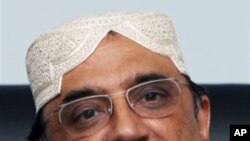Pakistan's President Asif Ali Zardari will meet with President Barack Obama at the White House on Friday, talks expected to focus on the Pakistani government's efforts against extremist forces. The talks come as the U.S. is offering Pakistan additional military and intelligence support for that battle.
President Zardari's talks with Mr. Obama in the Oval Office come about a month after the Obama administration assessment of its Afghanistan-Pakistan strategy.
The unclassified version of that assessment called progress in the strategic partnership with Pakistan substantial but uneven, saying among other things that greater cooperation is required in denying safe heavens to extremist groups along the border with Afghanistan.
President Obama and his administration have focused particular effort on the U.S.-Pakistan Strategic Dialogue, involving high level contacts at numerous levels between officials and leaders from the two sides.
Speaking in December, Mr. Obama said the U.S. remains focused on disrupting, dismantling and defeating al-Qaida in both Afghanistan and Pakistan and preventing it from having the capacity to threaten the U.S. and allies in the future.
But while he praised Pakistani military offensives in the tribal regions, Mr. Obama said more needs to be done.
"Nevertheless, progress has not come fast enough," said the president. "So, we will continue to insist to Pakistani leaders that terrorist safe havens within their borders must be dealt with. At the same time, we need to support the economic and political development that is critical to Pakistan's future."
U.S. officials have stressed their view that Pakistan has finally fully recognized the threat it faces from extremist groups, what Defense Secretary Robert Gates referred to in December as a "syndicate of terror."
In December, Gates emphasized the importance of a democratic Pakistani government knowing that the U.S. commitment will be long term.
"The relationship that we have with them and the more confident that they are that we have a long term relationship in mind with Pakistan, then I think the more willing they are going to be to take action that serves both our interests," he said.
With the approval of the U.S. Congress, the United States dramatically increased aid to Pakistan in 2009 with a $7.5 billion multi-year year plan. Additional development and other assistance has been added, including aid to help Pakistan deal with devastation from recent flooding.
President Zardari is in Washington to attend the memorial service for Richard Holbrooke, President Obama's Special Representative for Afghanistan and Pakistan, who died in December at the age of 69.
Both that memorial, as well as President Obama's talks with the Pakistani president are closed to press coverage, though the White House is expected to issue some sort of readout on the Oval Office talks.
The talks come just two days after U.S. Vice President Joe Biden visited Islamabad and met with President Zardari and other leaders.
Mr. Biden, in trying to dispel misconceptions in Pakistan about the U.S. role, said the United States is not waging a war on Pakistan but fighting violent extremists who, in Biden's words, violate Pakistan's sovereignty and corrupt its good name."
In December, President Obama has said he looks forward to visiting Pakistan this year. But a White House official told VOA that the Obama-Zardari talks on Friday will not produce a date for such a visit.




